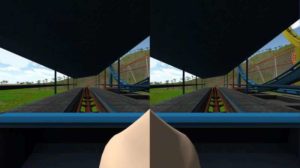Startup commercializing virtual reality sickness solutions, helps move virtual reality mainstream
 "Motion-to-photon latency, which is the time it takes for you to turn your head and the screen to refresh at the same rate, is one of the main culprits of VR sickness. If latency is present then the photons that represent the scene strike your retina out of sync with your head's motion. This lag causes your body to react negatively, inducing vertigo and sometimes nausea," he said. "Another factor is dissonance between the inputs received by the vestibular and visual systems. We call motion in virtual spaces vection. Vection is when your body moves forward and backward, left and right, or up and down, as opposed to rotating in a fixed position. The VR developer community has put forth a set of app design principles that recommends users primarily rotate in the virtual space rather than allow free vection. Discouraging vection reduces the degree of dissonance between the ocular and visual systems, and thus helps avoid simulator sickness."
"Motion-to-photon latency, which is the time it takes for you to turn your head and the screen to refresh at the same rate, is one of the main culprits of VR sickness. If latency is present then the photons that represent the scene strike your retina out of sync with your head's motion. This lag causes your body to react negatively, inducing vertigo and sometimes nausea," he said. "Another factor is dissonance between the inputs received by the vestibular and visual systems. We call motion in virtual spaces vection. Vection is when your body moves forward and backward, left and right, or up and down, as opposed to rotating in a fixed position. The VR developer community has put forth a set of app design principles that recommends users primarily rotate in the virtual space rather than allow free vection. Discouraging vection reduces the degree of dissonance between the ocular and visual systems, and thus helps avoid simulator sickness."
...in the animal kingdom every terrestrial predator can see its nose, so if it were a problem it seems like it would have evolved out. We surmised that being able to see one's nose was likely adaptive – a feature rather than a bug."
"What was interesting was that when we asked how distracting the nose was, the participants were baffled because they didn't even realize the nose was there. Just like one's own nose they didn't perceive it," he said. "We observed a 13.5 percent drop in severity of sickness and an increase of time in the simulator, just by adding a simple component that doesn't interfere with the game and is computationally very cheap."
Virtualis is a member of the Purdue Startup Class of 2016. Purdue has 27 startups based on Purdue intellectual property that were launched in the 2016 fiscal year.
Virtualis' virtual reality nose is patented through the Purdue Office of Technology Commercialization and currently available for license.
See the full story here: http://phys.org/news/2016-10-startup-commercializing-virtual-reality-sickness.html
Pages
- About Philip Lelyveld
- Mark and Addie Lelyveld Biographies
- Presentations and articles
- Tufts Alumni Bio